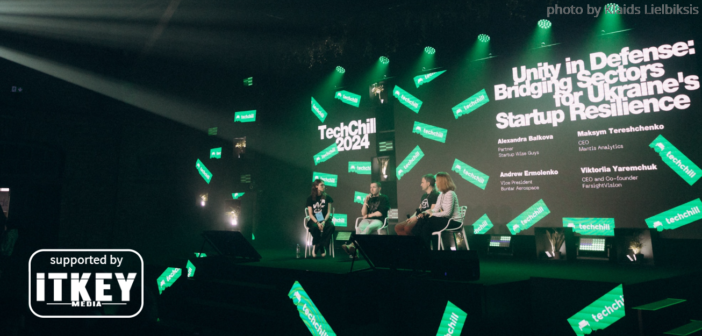- TechChill Riga – Europe’s most chill tech event – occupied two locations in the city on April 17-19th
- Despite the laid back atmosphere, the topics raised were quite serious – such as the Ukrainian war and Defense Tech
- The speakers argued that despite the military use is apparent, the war will be over and it’s best to strategize dual-use of the product
On April 17-19th, Riga’s Fantadroms and Hanzas Perons welcomed techheads from all over Latvia, the Baltics, CEE, and beyond at Europe’s most laid back tech event – TechChill Riga 2024. Latvia’s biggest tech event of the season invited more than 2,300 VCs, startup founders, their potential employees and customers, and all sorts of techies.
Over 120 recognized industry speakers scrutinized all the ongoing and emerging trends in the local and global startup scene. ITKeyMedia spotlights the panel discussion Unity in Defense: Bridging Sectors for Ukraine’s Startup Resilience. The participating panelists were:
- Alexandra Balkova, General Partner at Startup Wise Guys
- Maksym Tereshchenko, Co-Founder and CEO at Mantis Analytics
- Viktoriia Yaremchuk, CEO at Farsight Vision

Alexandra Balkova, General Partner at Startup Wise Guys
For the past couple of years, we’ve been observing a quite self-explanatory boom of interest in Defense Tech. As Ms Balkova reminded, investors expect startups to solve real-world problems, to which Russia’s war against Ukraine added new problems which Defense Tech solves. One of these problems is that the military sector isn’t aware of the existing technologies.
Mr Tereshchenko added that military organizations are designed not just to withstand the invasion and compete in the arms race but also to be strict and firm at that. A startup cannot just come and disrupt the existing state of affairs in this sector. As such, people who try to help solve the existing problems from the startup point of view face a real struggle because of the rigid structure. The solution is constant communication with the government and military officials at all times and everyday demonstration of the efficiency of innovative solutions backed by precise data.
How Does Communication Happen?
Mr Tereshchenko stated that there was no choice. Russia’s full-scale invasion started suddenly, the problem was too pressing, and the solution was needed immediately. Under such pressure, the mentioned rigid structure willingly cooperated with the volunteers from the broad tech community.
Fastforward two years, a lot of processes are already worked out. ‘We cannot win without the active use of innovation,’ Mr Tereshchenko concluded. In other words, a ‘fast-track bureaucracy’ is necessary for startups to work at an adequate speed.
As any founder, Ms Yaremchuk is always excited about her creations. In any area, this excitement gives the illusion that the target audience will start using the product as soon as they see it. It’s easy to forget that a military structure is a complex organization. In her experience, a good idea is to plan the scaling thoroughly – and, of course, to mingle within this structure.
‘In our case, community is everything, from all perspectives – from business goals, accessing test fields, military units to getting data sets and validating,’ Ms Yaremchuk stated
How to Sustain a Defense Tech Startup Team?

Viktoriia Yaremchuk, CEO at Farsight Vision
Importantly, the mentioned rigid structure and the added layer of bureaucracy prolong the deal making process, making it more challenging to sustain the team in the meantime. As Ukrainians, Ms Yaremchuk’s team started such cooperation on a volunteer basis anyway. However, the need to scale both the team and the product eventually lead to the need for additional resources – while the actual contracts may take years to prepare. Under such circumstances, the startup has such options as looking for additional funds (investments or grants) and making the product dual-use to expand the client base.
Mr Tereshchenko agreed that, starting out as volunteers, the team eventually burns out as resources deplete. Even in a state of urgency, the processes still take time from the side of the military. Therefore, surviving on sheer voluntary initiative isn’t and shouldn’t be sustainable. Either way, all the mentioned factors need to be taken into account while planning the strategy from the get-go.
Additionally, when a startup is able not only to survive but also to provide significant feasible value, it serves as the best demonstration of the solution’s viability for potential investors, clients, etc.
So, Focus on Military or Go Dual-Use?

Maksym Tereshchenko, Co-Founder and CEO at Mantis Analytics
Stepping in, Ms Balkova noticed that the situation provides startups with opportunities to cooperate not only with the military but also with big businesses – both Ukrainian and international – that also had to adapt urgently. These businesses were severely damaged by the war and primarily include agriculture and logistics (not exclusively, of course). Also, the startups’ vision often includes not only how they can help win the war but also how to help renovate afterward.
Ms Tereshchenko reminded that a dual-use product can attract investment easier. That’s why it’s best to have a dual-use plan in mind even when a startup focuses on military use exclusively. After all, the war is bound to be over, and the product remains.
Ms Balkova argued that a dual-use product would involve two customer personas / data sets which, in turn, suggests two different processes of getting a customer on board. This naturally involves additional operational cost. And it is regardless of whether the product is dual-use from the get-go or it pivots afterward, as Mr Tereshchenko pointed out. That said, the described approach is still the most viable.

Kostiantyn is a freelance writer from Crimea but based in Lviv. He loves writing about IT and high tech because those topics are always upbeat and he’s an inherent optimist!





